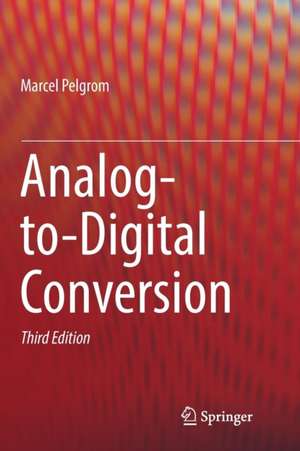Analog-to-Digital Conversion
Autor Marcel Pelgromen Limba Engleză Paperback – 16 iun 2018
This new, third edition emphasizes novel calibration concepts, the specific requirements of new systems, the consequences of 22-nm technology and the need for a more statistical approach to accuracy. Pedagogical enhancements to this edition include additional, new exercises, solved examples to introduce all key, new concepts and warnings, remarks and hints, from a practitioner's perspective, wherever appropriate. Considerable background information and practical tips, from designing a PCB, to lay-out aspects, to trade-offs on system level, complement the discussion of basic principles, making this book a valuable reference for the experienced engineer.
Preț: 541.21 lei
Preț vechi: 636.72 lei
-15% Nou
Puncte Express: 812
Preț estimativ în valută:
103.57€ • 106.100$ • 86.20£
103.57€ • 106.100$ • 86.20£
Carte tipărită la comandă
Livrare economică 25 martie-08 aprilie
Preluare comenzi: 021 569.72.76
Specificații
ISBN-13: 9783319831756
ISBN-10: 3319831755
Ilustrații: XXVII, 548 p. 506 illus., 287 illus. in color.
Dimensiuni: 155 x 235 mm
Greutate: 0.8 kg
Ediția:3rd ed. 2017
Editura: Springer International Publishing
Colecția Springer
Locul publicării:Cham, Switzerland
ISBN-10: 3319831755
Ilustrații: XXVII, 548 p. 506 illus., 287 illus. in color.
Dimensiuni: 155 x 235 mm
Greutate: 0.8 kg
Ediția:3rd ed. 2017
Editura: Springer International Publishing
Colecția Springer
Locul publicării:Cham, Switzerland
Cuprins
Introduction.- Sampling.- Sample-and-hold.- Quantization.- Accuracy.- Reference Circuits.- Digital-to-analog conversion.- Nyquist analog-to-digital conversion.- Time interleaving.- Sigma-delta modulation.- Characterization and specification.-
Notă biografică
Marcel Pelgrom received his B.EE, M.Sc, and PhD from Twente University, Enschede, The Netherlands. In 1979, he joined Philips Research Laboratories, where his research has covered topics such as Charge Coupled Devices, MOS matching properties, analog-to-digital conversion, digital image correlation, and various analog building block techniques. He has headed several project teams, and was a team leader for high-speed analog-to-digital conversion. From 1996 until 2003, he was a department head for Mixed-Signal Electronics.
In addition to various activities concerning industry-academic relations, he is a research fellow in research on the edge of design and technology.
In 2003, he spent a sabbatical in Stanford University where he served as a consulting professor. Since 2007, he has been a member of the technical staff at NXP Semiconductors. Dr. Pelgrom was an IEEE Distinguished Lecturer, has written over 40 publications, three book chapters, and holds 28 US patents.He currently lectures in the Philips Training Department at Twente University and for MEAD Inc.
In addition to various activities concerning industry-academic relations, he is a research fellow in research on the edge of design and technology.
In 2003, he spent a sabbatical in Stanford University where he served as a consulting professor. Since 2007, he has been a member of the technical staff at NXP Semiconductors. Dr. Pelgrom was an IEEE Distinguished Lecturer, has written over 40 publications, three book chapters, and holds 28 US patents.He currently lectures in the Philips Training Department at Twente University and for MEAD Inc.
Textul de pe ultima copertă
This textbook is appropriate for use in graduate-level curricula in analog-to-digital conversion, as well as for practicing engineers in need of a state-of-the-art reference on data converters. It discusses various analog-to-digital conversion principles, including sampling, quantization, reference generation, nyquist architectures and sigma-delta modulation. This book presents an overview of the state of the art in this field and focuses on issues of optimizing accuracy and speed, while reducing the power level.
This new, third edition emphasizes novel calibration concepts, the specific requirements of new systems, the consequences of 22-nm technology and the need for a more statistical approach to accuracy. Pedagogical enhancements to this edition include additional, new exercises, solved examples to introduce all key, new concepts and warnings, remarks and hints, from a practitioner’s perspective, wherever appropriate. Considerable background information and practical tips, from designing a PCB, to lay-out aspects, to trade-offs on system level, complement the discussion of basic principles, making this book a valuable reference for the experienced engineer.
· Covers the most relevant developments in analog-to-digital conversion, in a pedagogical framework suited for both graduate-level courses and professionals;
· Updates the second edition of this book to address recent technology developments, includes a new chapter on time-interleaved conversion, as well as a chapter on lay-out and other practical aspects;
· Includes new exercises, as well as solved, step-by-step examples to help introduce each new concept.
This new, third edition emphasizes novel calibration concepts, the specific requirements of new systems, the consequences of 22-nm technology and the need for a more statistical approach to accuracy. Pedagogical enhancements to this edition include additional, new exercises, solved examples to introduce all key, new concepts and warnings, remarks and hints, from a practitioner’s perspective, wherever appropriate. Considerable background information and practical tips, from designing a PCB, to lay-out aspects, to trade-offs on system level, complement the discussion of basic principles, making this book a valuable reference for the experienced engineer.
· Covers the most relevant developments in analog-to-digital conversion, in a pedagogical framework suited for both graduate-level courses and professionals;
· Updates the second edition of this book to address recent technology developments, includes a new chapter on time-interleaved conversion, as well as a chapter on lay-out and other practical aspects;
· Includes new exercises, as well as solved, step-by-step examples to help introduce each new concept.
Caracteristici
Covers the most relevant developments in analog-to-digital conversion, in a pedagogical framework suited for both graduate-level courses and professionals; Updates the second edition of this book to address recent technology developments, includes a new chapter on time-interleaved conversion, as well as a chapter on lay-out and other practical aspects; Includes new exercises, as well as solved, step-by-step examples to help introduce each new concept. Includes supplementary material: sn.pub/extras
